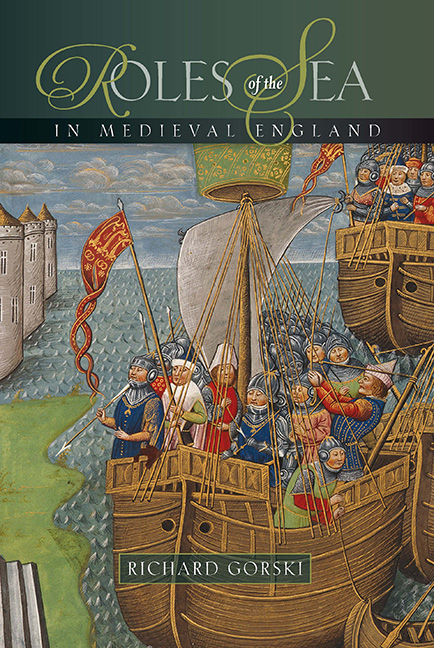Book contents
- Frontmatter
- Contents
- List of Contributors
- Map
- 1 Roles of the Sea: Views from the Shore
- 2 Changes in Ship Design and Construction: England in the European Mould
- 3 The Value of the Cinque Ports to the Crown 1200–1500
- 4 The Contribution of the Cinque Ports to the Wars of Edward II and Edward III: New Methodologies and Estimates
- 5 Keeping the Seas: England's Admirals, 1369–1389
- 6 The Cost-Benefit Analysis of a Fourteenth-Century Naval Campaign: Margate/Cadzand, 1387
- 7 Piracy and Anglo-Hanseatic Relations, 1385–1420
- 8 ‘Herring of Sligo and Salmon of Bann‘: Bristol's Maritime Trade with Ireland in the Fifteenth Century
- 9 How Much did the Sea Matter in Medieval England 167 (c.1200–c.1500)?
- Index
7 - Piracy and Anglo-Hanseatic Relations, 1385–1420
Published online by Cambridge University Press: 05 September 2016
- Frontmatter
- Contents
- List of Contributors
- Map
- 1 Roles of the Sea: Views from the Shore
- 2 Changes in Ship Design and Construction: England in the European Mould
- 3 The Value of the Cinque Ports to the Crown 1200–1500
- 4 The Contribution of the Cinque Ports to the Wars of Edward II and Edward III: New Methodologies and Estimates
- 5 Keeping the Seas: England's Admirals, 1369–1389
- 6 The Cost-Benefit Analysis of a Fourteenth-Century Naval Campaign: Margate/Cadzand, 1387
- 7 Piracy and Anglo-Hanseatic Relations, 1385–1420
- 8 ‘Herring of Sligo and Salmon of Bann‘: Bristol's Maritime Trade with Ireland in the Fifteenth Century
- 9 How Much did the Sea Matter in Medieval England 167 (c.1200–c.1500)?
- Index
Summary
A glance at the material dealing with relations between the kingdom of England and the loose trading alliance of North European towns known as the Hanse shows that, if one complaint is raised more than any other in the late Middle Ages, it is the issue of piracy. This, however, was not a defined crime until the Offences at Sea Act was passed in 1536; and even that did not use the actual word ‘piracy’, which does not appear in legislation until 1694. In medieval sources, the word pirata refers merely to a ship or person engaged in either violence or the appropriation of goods, either committed at sea or facilitated by seaborne transport. It does not necessarily carry overtones of illegality, or even disapproval: the letter of marque vessel, or the captain who takes a prize in royal service, may be called piratae. Contemporary legislation provided for compensation to those robbed at sea (under an act of 1353), and, from 1414, for charges of treason to be brought in certain specific circumstances. The 1536 Act was created because it was recognised that, as things stood, only civil proceedings were generally faced by ‘traitours pirotes theves robbers murtherers and confederatours uppon the see’, who as a consequence ‘many tymes escaped unpunysshed’, as was certainly the case in this era.
This chapter will discuss all kinds of violence at sea: but for want of a better definition, ‘piracy’ will refer throughout to any such act committed on water outside a port, without specific official sanction before the fact – whatever attitude the authorities took afterwards. As most such incidents in this period occurred in coastal waters or river estuaries, and recorded locations are rarely precise, it would be unhelpful to quibble over whether or not the incidents took place below the low tide mark, a necessary part of the modern legal definition.
The Basis of Anglo-Hanseatic Relations in the Later Fourteenth Century
Violence at sea is, unsurprisingly, much entangled with other issues in Anglo- Hanseatic relations, such as English demands that their merchants in Hanse towns should receive the same privileges as Hansards in England, the internal politics of England and the Hanse towns in an age when the merchant class was becoming politically important for the first time, and the broader geopolitics of Northern Europe.
- Type
- Chapter
- Information
- Roles of the Sea in Medieval England , pp. 125 - 146Publisher: Boydell & BrewerPrint publication year: 2012



